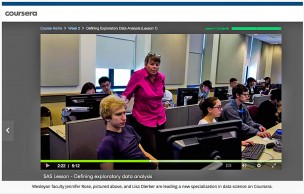On Sept. 15, Coursera will debut the University’s Data Analysis and Interpretation specialization.
On Sept. 15, Coursera, a technological enterprise that provides universal online courses free of charge to any and all interested, will debut over 30 specializations. Among the soon-to-come New Business and Computer Science concentrations will stand the University’s Data Analysis and Interpretation specialization.
In order to successfully complete the comprehensive Data Analysis and Interpretation specialization, learners will have to enroll in a series of four project-based courses. Some of the data science skills that learners will study include data visualization, regression modeling, and machine learning. Participants will conclude their specialization with a capstone project.
Pioneering the new specialization are Professor of Psychology and Director of Pilot Programs at the Center for Pedagogical Innovation Lisa Dierker, Professor of the Practice and Research Professor of Psychology and Institutional Review Board Director Jennifer Rose.
Upon learning that Coursera was interested in partnering with colleges on a number of different topics, including technical specializations, Dierker and Rose put forth a proposal which Coursera accepted.
With their specialization approved and equipped with widespread knowledge and training in the arena of statistical methods, the two professors resolved to teach the increasingly important skill of data science to others.
“The Data Analysis and Interpretation Specialization takes you from data novice to data analyst in just four project-based courses,” the course description reads. “You’ll learn to apply basic data science tools and techniques, including data visualization, regression modeling, and machine learning.”
Coursera serves as an outlet for individuals who may not have the time or interest to invest in a degree but are looking to increase their skill sets. Additionally, this specialization caters to people in the workforce who find that although they previously did not need to know data analysis, skills such as making spreadsheets have become necessary.
“Compared to even a decade or more ago, as a society, we are now literally swimming in data,” Dierker said. “Turning this data into meaningful information and being able to tell its story requires analytic skills.”
In large part, this project grew out of Dierker’s grant from the National Science Foundation (NSF) to further push and disseminate her inquiry-based, supportive approach to statistical data. The grant enabled her to partner with institutions such as Ashesi University in Ghana, SUNY-Purchase College, Scarsdale High School, Housatonic Community College, South Western Oklahoma State University, Concordia College (Texas), SUNY Downstate Medical Center, and Appalachian State University.
The Applied Data Analysis course that Dierker and Rose have been teaching for years at the University has stood as a blueprint for the specialization they have created on Coursera.
The first course of the specialization will be released on Sept. 15, with the consecutive courses following suit every few weeks.
Learners will have the opportunity to enroll in the courses free of charge. However, if learners wish to gain a formal certificate of completion, they must pay $79 per course and an additional $79 for the capstone project. Upon completing the four courses, learners will decide whether they want to obtain the certificate, which, while not comparable to a degree, is still a valuable asset in the workforce when presented to current or potential employers.
From the onset of the specialization, learners will work actively to answer a research question of their own choosing, and throughout the remainder of the specialization will perform statistical methods in pursuit of the answer. Dierker and Rose believe that this project-based, personal way of learning will drive students to internalize and retain what they learn.
“People want answers to their questions,” Rose said. “As human beings we want to know what is going on around us. Learners become so excited to answer their own questions, that the learning itself is painless; they want to learn. After completing the project-based specialization, they will gain real life experience that they can take with them to their job or wherever it is that they want to use it.”
Jalen Alexander ’14 shed more light on the course’s inquiry-based philosophy in a student mentor interview aired on Dierker’s Passion-Driven Statistics website.
“We really want the passion to come from them [the students] and we don’t think we can instill passion in someone by giving them a canned question or a canned path to an answer,” he said. “We really want the students to be able to explore that for themselves. And so yes that can cause panic, but I think it makes the experience more valuable for the student. By the end they are really a lot more excited and happy when they get to do their poster presentation and they are presenting their own research, and they are presenting research on questions that they had and not that someone gave to them.”
“You really feel like the project is yours, and so it sort of becomes like your baby,” Gabriella Monitola ’17, who completed the course, said.
Though they acknowledge that for some, simply hearing the term data analysis can be daunting, Dierker and Rose want everyone, from women to other underrepresented groups in the field and everything far and in between, to feel welcomed and empowered by the specialization.
“We want to make this work for everyone and we want to empower people to feel that they can be data analysts,” Rose said.

Comments are closed